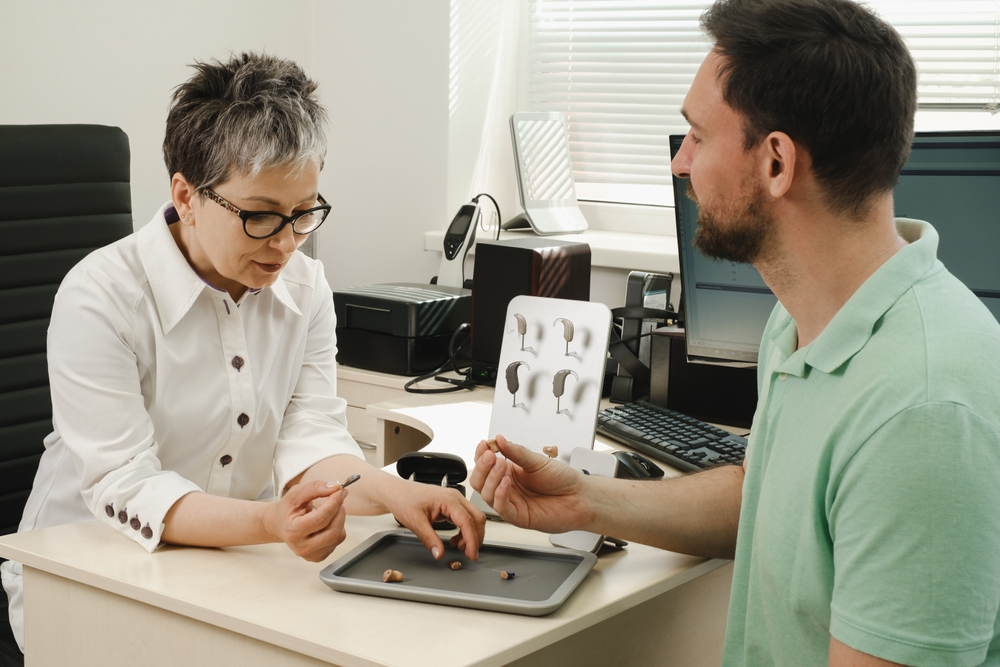Put on your thinking caps, because this device can improve cognitive abilities. Oh. Okay, we understand how that intro could have been confusing. The thinking caps suggestion was just a turn of phrase–the real device that’s going to improve cognitive abilities is not a “cap” at all. This device is (drumroll please)…your hearing aid!
This is not to say that hearing aids are somehow going to make you smarter. They aren’t literal thinking caps. But there’s some compelling research that suggests hearing aids can improve cognitive abilities, lowering your risk for depression, dementia, and anxiety.
You do a lot of hearing with your brain
To understand the link between cognition and your ears, it’s important to understand that a significant portion of your hearing actually happens in your brain. That’s where the vibrations of the world are transformed into the sounds of your surroundings. So as your hearing wanes, the parts of your brain that interpret those sounds suddenly have a lot less to do.
In combination with other factors (such as social isolation), the changes in your brain (and hearing) can lead to the onset of certain mental health issues. In persons with untreated hearing loss, it’s not uncommon to notice an increase in the risks for depression, anxiety, and dementia.
When you wear hearing aids, you’re effectively “treating” your hearing loss. That means:
- The parts of your brain responsible for hearing will get a more consistent workout; the more your brain works, the healthier your brain stays.
- You’ll be less likely to isolate yourself socially. Conversations will be easier to understand and follow, so you’ll be more likely to engage.
- Because you’ll be able to couple your hearing aids with regular monitoring and other treatment options, you can help keep your hearing from getting progressively worse.
Keeping you on your toes
Hearing aids appear to slow depression, anxiety, and dementia because they stimulate your brain and your social life. But hearing aids have gotten so advanced they can actually help keep you on your feet–literally–by preventing falls and injuries from falls.
- Inner ear health: Hearing loss in and of itself will not cause inner ear damage. However, sometimes hearing loss and inner ear problems have a common cause. So treating the one can help you treat the other–and in some cases, a hearing aid is a part of that treatment regimen.
- Raising awareness: Sometimes you fall because you aren’t aware of your surroundings. Diminished hearing ability can drastically reduce your situational awareness. Not only can it be difficult to hear sounds, but it can also be challenging to determine which direction sounds are coming from. Without treatment, this can end up leading to a fall or injury.
- New technology: Hearing aids have begun incorporating novel technology that can actually alert emergency contacts (or emergency services) when someone wearing the hearing aids experiences a fall. This may not prevent the fall in the first place, but it can prevent long-term injuries or complications due to the fall.
Ultimately, when you’re wearing a hearing aid, you’re more likely to avoid a fall in the first place. A hearing aid keeps you more alert, more aware, and more connected–improving cognitive abilities and physical health at the same time.
Start wearing your hearing aid
We haven’t even touched on the fact that a hearing aid will also, you know, help you hear. So when you take that amplified hearing, factor in the mental health benefits and the physical well-being, it seems like wearing these devices would be an easy decision (not something you need to put your thinking cap on for).
The problem is that many people don’t know they have hearing loss. When your hearing disappears slowly, you might have a hard time noticing. That’s why it’s essential to see your hearing specialist on a regular basis. Without treatment, hearing loss can exacerbate a wide range of other health issues.
But with the right treatment plan, a hearing aid can, in part, slow the onset of depression, dementia, while reducing the incidents of some physical injuries. That’s a striking combination of benefits that–and they also help you hear. That makes hearing aids, well, kind of a no-brainer (I’ll show myself out).



